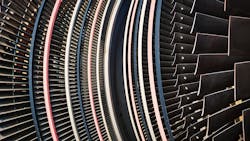Without AAR, Lake Superior College Keeps Faith in Its Airplane Mechanics Program
Sep. 6--With frequent F-16 traffic from the 148th Fighter Wing screaming outside open hangar doors, Lake Superior College couldn't ask for a better backdrop for its twin flight school and aviation maintenance technology program.
But there's one void in the landscape north across the main runway at Duluth International Airport.
It's the empty hangar where AAR used to be.
"It's unfortunate AAR closed," aviation maintenance technology instructor Will Beecroft said. "They were a big employer for our students. I'm worried people will look at AAR closing and wonder if it's happening everywhere. But there is always going to be a need for mechanics."
When AAR left Duluth in May during a historic nosedive in air travel due to the COVID-19 pandemic, a partnership that had become a reliable school-to-work pipeline vanished.
Still, Beecroft, students and college administration are bullish on its aviation maintenance technology (AMT) program.
"I just kind of have an open mind," said second-year student Joe Dempsey, 19, of Northfield, Minnesota. "I knew that there were numerous opportunities. There are a lot of companies that come in and pitch to us."
Daniel Fanning was part of a city of Duluth team that helped land AAR in 2012 as a replacement to Northwest Airlines before it. He's now the spokesperson for the college.
"Half of the graduates from the AMT program went to AAR and the other half went elsewhere," Fanning said of the program's history. "We're still very much here. Students who were leaning to AAR are probably going to have to go somewhere else to have a career."
That hasn't dissuaded students yet. The AMT program started fall semester with a record 85 students -- two more than at the start of 2019-20 school year.
"We've only been growing since day one," Beecroft said. "This is a good career to get into, with good jobs. It's not just one location; you can go anywhere in the world and work as an AMT."
Indeed, Dempsey chose airplanes, he said, because "you can be a mechanic -- or you can be an airplane mechanic."
AMT curriculum covers almost two straight years of course and lab work. Beecroft used to lecture on one topic and then his students would pile into a lab, with its real-life jet and single-propeller engines, and learn for real. Now, due to coronavirus, he's virtual lecturing in triplicate and then releasing small groups of students to separate labs so they can be socially distanced on the hangar floor.
The lab is where it clicks for most students, Beecroft said, because most of them are hands-on learners.
What AAR gave them was a chance to apply their work in a live setting. It offered $10,000 tuition to students it employed, and even allowed learning access to its hangar floor -- a working lab in which everybody in the building was a mechanic. At its peak, AAR used 375 employees to overhaul and repair Air Canada's fleet of 90 Airbus A319, A320 and A321 series passenger jets. Beecroft noted that AAR is currently hiring at some of its other locations.
Other local aviation employers, most notably Cirrus Aircraft, don't offer the same professional outlet for mechanics.
"It's manufacturing instead of maintenance, but that's the next closest thing we can get that still has something in the aviation field that's attainable and open to hiring quite a few people," second-year student Samuel Weiss, 25, of Victoria, Minnesota, said.
Weiss insists on staying in Duluth even after he's certified.
"That's my window," he said.
For now, that's enough.
"We're fortunate to have Cirrus and some of the smaller companies," Fanning said. "We've got a good aviation sector. We're going to be OK, but we'll be better if we can find someone to replace AAR in the hangar."
There were signs last week that an air travel rebound has started. The Transportation Security Administration reported 877,698 U.S. airport travelers in a single day Thursday -- the highest number since March.
Beecroft said the current downturn will influence a lot of mechanics to retire early, leaving a void to fill when the industry needs help. Airplanes are built to fly, he said, and sitting around getting dusty will only cause more mechanical problems.
"Now is the best time to come into a program like ours," Beecroft said, "because by the time the aviation industry turns around, you're going to have your license in pocket and there is no need to wait. You're ready to rock and roll."
He's currently teaching one class of second-year students that's his largest ever at 22.
Fanning hopes some entity like Delta Air Lines, a partner with LSC's program, or FedEx sees the empty Duluth hangar, the community support, the college feeder system, and how it's set up for success.
"We need mechanics throughout the country and world, and at some point demand is going to come back," Fanning said. "That's why we're keeping the program as long as possible, because we know there's a need for it."
___
(c)2020 the Duluth News Tribune (Duluth, Minn.)
Visit the Duluth News Tribune (Duluth, Minn.) at www.duluthnewstribune.com
Distributed by Tribune Content Agency, LLC.
